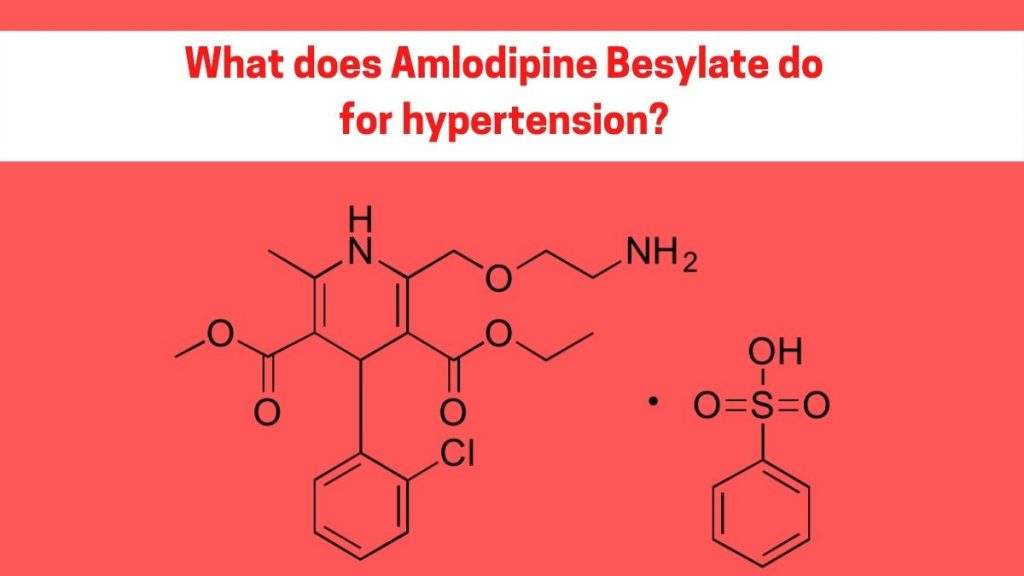
What Does Amlodipine Besylate Do For Hypertension?

The term hypertension is derived from two basic words: hyper, which means high, and tension, which means pressure. Hypertension is just a term that refers to excessive blood pressure. A pressure reading indicates that a force has been produced as the heart contracts and pumps blood through the blood arteries that transport it to different regions of the body.
However, while hypertension does not always indicate or result from excessive emotional strain, research suggests that stress and emotional tension may induce a rise in blood pressure that, if left unchecked, may be long-lasting. Untreated hypertension may result in a variety of health problems later in life.
A wide variety of remedies are now available in internet shops that claim to be able to treat hypertension-related problems. Amlodipine Besylate is a medication that may be used to treat high blood pressure problems. Today, it is a popular treatment recommended by health care professionals to their patients. All users benefit from the presence of active components in Amlodipine Besylate, such as withania somnifera, which ensures their safety and excellent health. Amlodipine Besylate exporters are supported by a highly efficient staff of experienced pharmacologists and other specialists who are dedicated to providing clients with the most effective pharmaceutical goods. The goods manufactured by them are renowned for their extended shelf life, excellent purity, rapid relief, non-toxicity, and precise formulation.
Amlodipine Besylat – Indications and dosage
Amlodipine is used to treat high blood pressure, either in combination with other medicines or alone. Stroke, heart attack, and renal issues may all be prevented by lowering high blood pressure levels. Amlodipine is a calcium channel blocker, which is a kind of medication that is often prescribed. It works by relaxing blood arteries, allowing more blood to flow through them. It is also used to prevent some kinds of chest discomfort, such as angina pectoris (angina). It may aid in increasing your capacity to exercise as well as decreasing the frequency of angina episodes in certain people. It should not be used to treat episodes of chest discomfort that recur spontaneously or on a regular basis.
The dose of amlodipine is determined by the individual’s condition as well as how effectively their symptoms react to the medication. When suggesting a dose, the doctor will take into consideration the patient’s age and medical history as well as other factors.
What is the reason for prescribing this medication?
The selection of the “best” high blood pressure medicine is influenced by a number of factors, including the patient’s overall health, his or her age, ethnicity, and whether or not they have any co-existing medical conditions or drug sensitivities, among others.
For the treatment of hypertension in adults and children 6 years and older, amlodipine may be used either alone or in combination with other medicines. Angina (chest discomfort) and coronary artery disease are two conditions for which it is prescribed (narrowing of the blood vessels that supply blood to the heart). Amlodipine is a medicine that belongs to a family of drugs known as calcium channel blockers. It reduces blood pressure by relaxing the blood arteries, allowing the heart to work less hard as a result of the relaxation. It alleviates chest discomfort by increasing the amount of blood that is delivered to the heart. Amlodipine, when taken on a regular basis, may help to manage chest discomfort, but it cannot stop it once it has begun. When you are experiencing chest discomfort, your doctor may recommend that you take a different medicine.
High blood pressure is a frequent disease that, if left untreated, may result in damage to the brain, heart, blood vessels, kidneys, and other organs of the body, among other things. Injuries to these organs may result in heart disease, a coronary artery bypass graft surgery, heart failure, a stroke, kidney failure, eyesight loss, and other complications. Making lifestyle modifications, in addition to taking medication, will aid in the management of your blood pressure. These modifications include adopting a low-fat, low-sodium diet, keeping a healthy weight, engaging in moderate physical activity for at least 30 minutes most days, quitting smoking, and drinking alcohol in moderation.